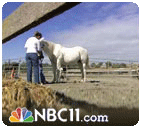Medicine and Horsemanship
Medicine and Horsemanship teaches medical students and other healthcare students and practitioners to develop awareness of the subtleties of self-presentation and communication that are necessary for the provider-patient relationship and all other professional encounters.
A major challenge for health science students in their clinical years and for healthcare providers throughout our careers is to conduct our relationships with patients, colleagues, "superiors," and employees in a manner that is professional, sensitive, perceptive, confident, and authentic. Especially with regard to patients, our interactions must be characterized by compassion, insight, and respect.
Horses are large, but nevertheless easily frightened, prey animals whose survival has depended on becoming exquisitely sensitive to body language, innuendo, and emotional tone, and to the position and movement of objects in their sensory fields. Horses react to signals and intents of which we aren’t even aware; much less aware that we’re communicating outward. Horsemanship requires an appreciation of the nonverbal as well as verbal messages that we give to others. Horses train us to notice at all times the information that we convey by touch, voice, and body language.
Horses develop in us the three nonintellectual, nonrational aspects of our intelligence—instinctual, emotional, and sensory—that may have atrophied in our quest for the correct answers on exams, the right diagnosis, or the most relevant journal article.
Unlike our patients, horses will tell us when we have violated their boundaries and have not clearly set our own. They show us when they’re confused about our instructions. They let us know when we have touched them too roughly or inattentively. They show their appreciation for gentleness and honesty and clarity of intent. Because horses react to the most subtle human signals, they hold up a magnifying mirror to ourselves and our behaviors. In this mirror we see the image and path for our professional development and our personal growth.
Medicine and Horsemanship is taught in a ranch setting in half-day, one-day, or two-consecutive-day programs for healthcare professionals and as a seven-week class for Stanford medical students. Medicine and Horsemanship is especially relevant given new requirements by the National Board of Medical Examiners and many specialty Boards for videotaped demonstration of clinical interviewing skills. This is a non-riding program and no previous horse is experience is required.
For more information about Medicine and Horsemanship contact sensei@horsensei.com or call 650.868.3379.


